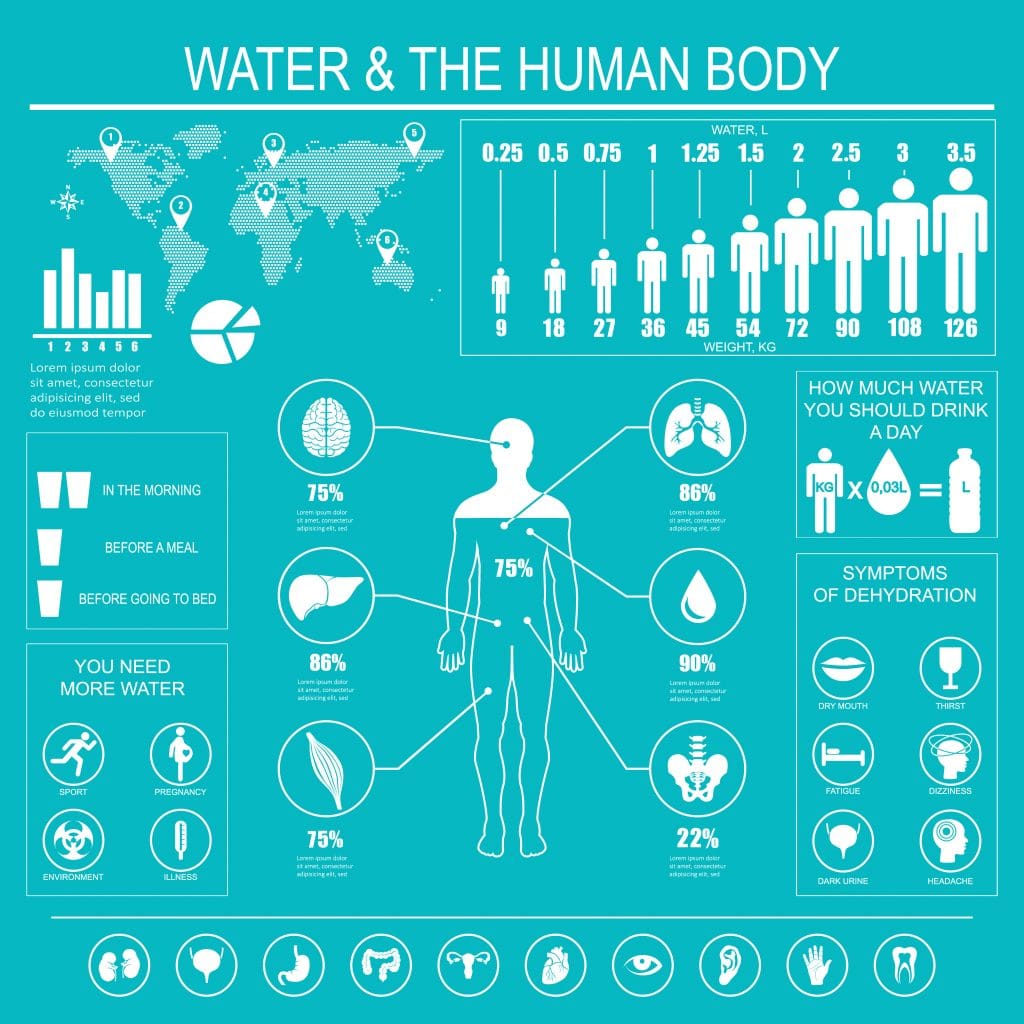KEY TAKEAWAYS: Employees who are not drinking enough water risk dehydration, which can lead to serious illness. The dangers of inadequate hydration highlight the importance of keeping employees hydrated and healthy! In this article, we discuss the risks of dehydration at work, and also provide risk prevention methods for employers.
Jump Ahead
The majority of the human body is made up of water. It’s absolutely crucial for both our survival and optimal wellness. An average of 60% of the adult body is comprised of water with areas such as the brain, heart, kidneys, and muscles taking the lead when it comes to water content. Over 70% of these body parts are comprised of water.
Studies suggest that many people are in a mild, but chronically dehydrated, state. Although it’s easy to brush off mild dehydration as unimportant, it deserves much closer care and attention. All the organs and systems, and in fact, every cell in the body relies on water for optimal functioning. Even small hydration deficits have been shown to have negative effects that could impact the everyday worker.
Why Does Dehydration Occur?

Dehydration occurs when your body loses more fluid than you’re taking in. There could be a number of reasons for this.
Generally, if a person is not drinking enough fluids they will become dehydrated. Some beverages such as tea and coffee can also have a diuretic-like effect and flush water out of the body. This could add to the effects of dehydration.
Workers who have been experiencing vomiting and/or diarrhea may be more likely to become dehydrated because of fluid loss from the body. Some medical conditions and illnesses can also cause a person to be more prone to dehydration. For example, fevers can contribute to fluid loss.
Environment and activities can also significantly affect hydration levels. Workers undergoing tasks in hot or humid weather conditions are often more likely to become dehydrated. Those in very active roles that require physical labor can also become dehydrated far more easily. This is especially true if the employee in question is losing water through sweat and isn’t adequately replacing that fluid loss.
Dangers Of On-The-Job Dehydration
A worker who is dehydrated might not even feel thirsty, but they could already be dehydrated. Or, they could exhibit symptoms of dehydration, such as thirst, or signs of dehydration, such as dry lips and mouth.
Below are some of the potential dangers of on-the-job dehydration. Employers need to be aware of these because all of them can have a negative impact on job performance.
- Decreased physical performance. Employees in job roles that require significant physical labor may experience a reduction in physical performance if they are dehydrated. As little as 2% water loss has been shown to result in a decrease in physical performance in athletes. Dehydration can cause the muscles in the body to feel fatigued and weak. If an employee is completing physical tasks such as lifting or moving heavy objects in a dehydrated state, they could also experience muscle cramps. In general, employees who are dehydrated are likely to feel weaker than usual and low on energy.
- Impaired cognitive functioning. Even mild levels of dehydration can lead to disruptions in mood and cognitive functioning. An employee who is dehydrated may not be able to focus well on the task at hand. They could feel confused or like they have “brain fog.” They might feel irritable, and their memory could be affected. It’s important that employers are aware of these risks. Decreased cognitive performance can have a negative impact on productivity and accuracy when it comes to pretty much any job task. This is especially important to consider for employees in safety-sensitive positions, such as commercial drivers.
- Decreased blood volume and its associated problems. Blood contains a high volume of water. Without sufficient water, blood volume can decrease. Subsequently, this can lead to a drop in blood pressure. Since oxygen is carried in red blood cells, the body may not receive the oxygen supply it needs. A worker who is dehydrated and has a decreased blood volume in their body could feel dizzy, light-headed, confused, and fatigued.
- Kidney problems. Infrequent urination is 1 potential sign of dehydration. A sufficient water intake is important for flushing waste products out of the body, and for optimal functioning of the kidneys. When dehydration is ongoing, the worker could experience problems with their kidneys, such as kidney stones. Although kidney stones often develop through a combination of factors, dehydration can be one of them. Improving hydration levels is an important part of treating the problem.
- Seizures. Optimal hydration helps to maintain electrolyte balance in the body. Without enough electrolytes such as sodium and potassium, messaging between cells can become impaired and could cause seizures. These mixed-up electrical signals can cause involuntary muscle contractions and sometimes a loss of consciousness.
- Headaches. Headaches can have many causes including stress and muscle tension. One possible contributing cause of headaches, however, is dehydration. On-the-job dehydration-related headaches could be prevented if the body is kept sufficiently hydrated.
- More serious complications. Mild dehydration can typically be treated by increasing fluid intake. A specific rehydration solution containing fluids and electrolytes may be required to replenish the body. However, when dehydration becomes much more severe, medical treatment will be needed.

Some of the dangers listed above will pose even more of a threat if dehydration becomes very severe. Kidney problems could progress to kidney damage or even kidney failure at the extreme end of the spectrum. Dehydration from hot weather or exercising could progress to heat exhaustion, or more seriously, heatstroke.
A very low blood volume could lead to organ failure because the heart isn’t receiving sufficient blood to supply the body. At the extreme level, dehydration can be fatal.
Conclusion: Employers Can Play An Important Role In Helping Employees To Stay Hydrated
Employers can help employees to stay hydrated and avoid the dangers associated with dehydration. As part of a workplace culture of wellness, consider investing in a quality water filter for your workplace. Simply providing clean drinking water helps show employees that you care about their health.

As part of creating a healthy office workspace, employers can also provide education to employees about the importance of staying hydrated. Employees need to learn to recognize signs of dehydration, such as darker urine.
They also need to understand that thirst signals can often be mistaken for hunger signals. Although food does contain water (with foods such as fruits and vegetables containing high levels), an adequate and appropriate fluid intake is going to be the biggest consideration when it comes to hydration.
Reminders about the importance of hydration could be posted around the workspace, or challenges could be set up to help employees improve their water intake. Water quality in the building should also be tested regularly.
Written by Elly McGuinness
Elly has been inspiring people to make sustainable changes to their health, fitness and lifestyle for the past 15 years. She offers online solutions for people who are looking to get started on, or improve their health and fitness. She blogs regularly, writes for a number of health and well-being publications and is the published author of a holistic weight loss book.
You May Also Be Interested In…
- Do You Have Reasonable Suspicion?
 Employers cannot initiate reasonable suspicion testing without first going through the 5-step process. Reasonable suspicion training provides critical information about how to initiate reasonable suspicion testing, including the 5-step process and other tools that employers can use to help manage the misuse of alcohol and drugs in the workplace.
Employers cannot initiate reasonable suspicion testing without first going through the 5-step process. Reasonable suspicion training provides critical information about how to initiate reasonable suspicion testing, including the 5-step process and other tools that employers can use to help manage the misuse of alcohol and drugs in the workplace. - An Employer’s Guide: What You and Your Employees Need to Know About DOT Drug & Alcohol Testing
 When implementing or maintaining DOT Drug & Alcohol testing, there are key areas that employers should consider.
When implementing or maintaining DOT Drug & Alcohol testing, there are key areas that employers should consider. - SureHire Occupational Testing Acquires COHR Health: A Positive Step Towards Safe, Healthy, Productive Workforces and Communities
 We are thrilled to announce that today, May 6, 2024, SureHire Occupational Testing has officially acquired COHR Health, a well-known leader in occupational health services. Read on…
We are thrilled to announce that today, May 6, 2024, SureHire Occupational Testing has officially acquired COHR Health, a well-known leader in occupational health services. Read on… - Occupational Testing Use Case – Mining
 In this case study, we will explore how mining companies can use various types of occupational tests to reduce Total Recordable Incident Rates (TRIR) long term.
In this case study, we will explore how mining companies can use various types of occupational tests to reduce Total Recordable Incident Rates (TRIR) long term. - 9 Strategies to Keep Workers Cool on Drilling Sites During Hot Summer Months
 This article delves into strategies to keep workers cool and safe on drilling sites during the hot summer months.
This article delves into strategies to keep workers cool and safe on drilling sites during the hot summer months. - Hearing Conservation Basics: How to Manage Occupational Noise
 Learn how to proactively mitigate occupational noise risks and help prevent NIHL among workers.
Learn how to proactively mitigate occupational noise risks and help prevent NIHL among workers.

